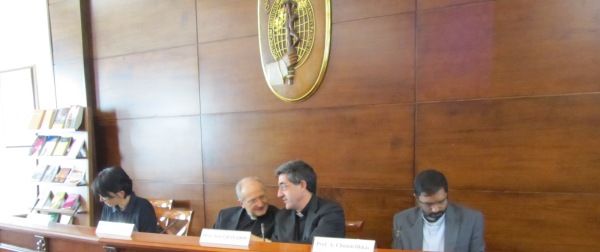
On June 27th and 28th, the International Council of the Pontifical Institute “John Paul II” for Studies on Marriage and Family met in Rome, at its seat in the Lateran, with the representatives from all the extra-urban sections of the Institute, on the theme: “Anthropology of Generativity.” Both mornings were devoted to communications and public interventions. The speakers were, successively:
- on Thursday the 27th: Prof. F. Botturi, Prof. A. Lopez and Prof. M. Binasco
- on Friday the 28th: Prof. J. Granados, Prof. Sr. B. Rossi and Prof. A. Chundelikkat
In his lecture, the Vice President of the Institute’s central section, Rev. Father José Granados, proposed a reflection entitled: "Generativity: The Key to a Theological Synthesis”, in which he evoked the parent / child and man / woman relationships. Prof. Granados made this affirmation: «Generation offers a new point of view for understanding the specific value of sexual difference and of its particular contribution to the common good. Every human birth involves the participation of the male and female elements. Thus, it is a reminder that generation cannot be reduced to man’s individual will but is rather based on a greater reality: the primordial language of the flesh, in which a man and a woman express their love. Only when a father and a mother welcome their child in the language of sexual difference is it possible to maintain this ‘plus,’ which is specific to each birth and prevents the child from being reduced to the individual will of the parents. Deleting the sexual difference in generation implies eliminating the distinction between child and servant». The sexual difference thus appears as a sign that reveals that each human life belongs to the mystery of a Primordial Origin, which is beyond man’s control. «Male and female are the two irreducible ways through which the transcendent Source of life make’s itself present to their child. Since this unique Source is always represented by the two, it can never be identified with the will of the father or of the mother; it always remains in the inexhaustible mystery of its gratuity, as the Source of each person’s distinctive character. The full presence, within history, of this original Source of love, a presence that the Christian faith confesses, calls for a transformation of the human way of generating, as Jesus’ life will teach us».
The Secretary of the Pontifical Council for the Family, Msgr. Jean Laffitte, a member of the Institute’s teaching faculty, celebrated Holy Mass in the Baptistery of St. John Lateran, on the liturgical memorial of St. Irenaeus, Bishop and Martyr, on the afternoon of Friday, June 28th. In his Homily, Msgr. Laffitte spoke about Abraham’s amazement when God promised to give him offspring, despite the fact that his wife Sarah was already aged, nearly a hundred years old. «His amazement originates with the awareness that he has become the recipient of a special blessing: having descendants who will become nation». God indicates the name of the son who will be born to him: Isaac; He also reveals the date on which Sarah will give birth and promises to establish an alliance with her offspring. «The promise of fruitfulness confronts us with the need to give a response inspired by faith», Msgr. Laffitte said. «Abraham is not asked to believe that it’s possible to become a father and a mother at almost a hundred, but he is called to believe that God cannot fail to keep His promise. Adherence to God’s word goes far beyond any scientific explanation that can claim to explain what is inexplicable». There is a “superior rationality” in Abraham’s act of faith, and this is why he became “the father of all believers”. «We, modern people, are encouraged to learn from Abraham that God’s word cannot be subjected to scientific testing that would allow us to make the rules. Isaac’s coming into being is a miracle, that is, it’s an epiphany of the Omnipotence of God, the only giver of life. Human intelligence is not offended by the fact that nature’s Creator shows Himself capable of transcending the rules that guide it, simply because He himself established them». Then, Msgr. Laffitte concluded: «May our commitment in favor of human love, marriage, fatherhood and the family, be nourished by the divine source of life and faith».